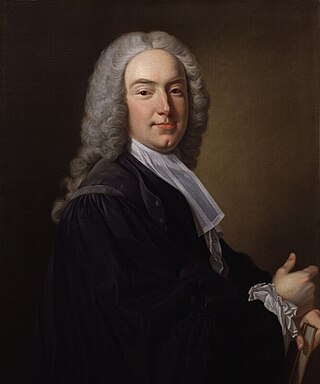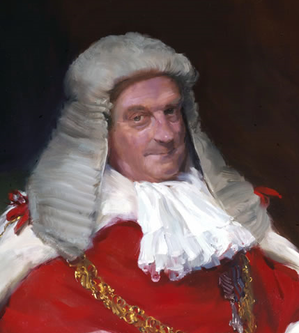
Robin Brunskill Cooke, Baron Cooke of Thorndon, was a New Zealand judge and later a British Law Lord and member of the Judicial Committee of the Privy Council. He is widely considered one of New Zealand's most influential jurists, and is the only New Zealand judge to have sat in the House of Lords. He was a Non-Permanent Judge of the Court of Final Appeal of Hong Kong from 1997 to 2006.

William Murray, 1st Earl of Mansfield, PC was a British barrister, politician and judge noted for his reform of English law. Born to Scottish nobility, he was a member of the Scottish Clan Murray and was educated in Perth, Scotland before moving to London at the age of 13 to take up a place at Westminster School. He was accepted into Christ Church, Oxford, in May 1723, and graduated four years later. Returning to London from Oxford, he was called to the Bar by Lincoln's Inn on 23 November 1730, and quickly gained a reputation as an excellent barrister.

James Richard Atkin, Baron Atkin,, commonly known as Dick Atkin, was an Australian-born British judge, who served as a lord of appeal in ordinary from 1928 until his death in 1944. He is especially remembered as the judge giving the leading judgement in the case of Donoghue v Stevenson in 1932, in which he established the modern law of negligence in the UK, and indirectly in most of the common law world.

Geoffrey Dawson Lane, Baron Lane, was a British barrister and judge who served as Lord Chief Justice of England from 1980 to 1992, having previously served as a Lord of Appeal in Ordinary from 1977 until 1980.
John Anson Brightman, Baron Brightman, PC was a British barrister and judge who served as a law lord between 1982 and 1988.
Sir Robert Edgar Megarry, PC, FBA was an eminent British lawyer and judge. Originally a solicitor, he requalified as a barrister and also pursued a parallel career as a legal academic. He later became a High Court judge and served as Vice-Chancellor of the Chancery Division from 1976 to 1981. Afterwards he served as Vice-Chancellor of the Supreme Court from 1982 until his retirement in 1985.
Sir Patrick James Hunt was an English barrister and a judge of the High Court of England and Wales.
Peter Julian Millett, Baron Millett,, was a British barrister and judge. He was a Lord of Appeal in Ordinary from 1998 to 2004.

Peter Raymond Oliver, Baron Oliver of Aylmerton, PC was a British barrister and judge who served as a Lord of Appeal in Ordinary between 1986 and 1991. The son of an academic lawyer, he served with distinction during the Second World War, before joining the Chancery bar. He was appointed to the High Court in 1974, to the Court of Appeal in 1980, and to the House of Lords in 1986, having earlier been tipped to succeed Lord Denning as Master of the Rolls in 1982. He retired in 1992, and in later life suffered from loss of sight.
Sir Nicholas Richard Pumfrey styled The Rt Hon. Lord Justice Pumfrey, was a British barrister. He served as a High Court judge for 10 years, and was promoted to the Court of Appeal little more than a month before his sudden death.
Attorney General v Observer Ltd [1990] is an English tort law case on breach of confidentiality. It also raised questions of the interests of public policy and freedom of expression, under the European Convention on Human Rights, because it involved a spy's publication of secret information.

Alfred Thompson "Tom" Denning, Baron Denning,, was an English barrister and judge. He was called to the bar of England and Wales in 1923 and became a King's Counsel in 1938. Denning became a judge in 1944 when he was appointed to the Probate, Divorce and Admiralty Division of the High Court of Justice, and transferred to the King's Bench Division in 1945. He was made a Lord Justice of Appeal in 1948 after less than five years in the High Court. He became a Lord of Appeal in Ordinary in 1957 and after five years in the House of Lords returned to the Court of Appeal as Master of the Rolls in 1962, a position he held for twenty years. In retirement he wrote several books and continued to offer opinions on the state of the common law through his writing and his position in the House of Lords.
Sir Arthur Fairfax Charles Coryndon Luxmoore was a British barrister and judge who sat as a Lord Justice of Appeal

Cream Holdings Ltd v Banerjee [2004] UKHL 44 was a 2004 decision by the House of Lords on the impact of the Human Rights Act 1998 on freedom of expression. The Act, particularly Section 12, cautioned the courts to only grant remedies that would restrict publication before trial where it is "likely" that the trial will establish that the publication would not be allowed. Banerjee, an accountant with Cream Holdings, obtained documents which she claimed contained evidence of illegal and unsound practices on Cream's part and gave them to the Liverpool Daily Post & Echo, who ran a series of articles on 13 and 14 June 2002 asserting that a director of Cream had been bribing a local council official in Liverpool. Cream applied for an emergency injunction on 18 June in the High Court of Justice, where Lloyd J decided on 5 July that Cream had shown "a real prospect of success" at trial, granting the injunction. This judgment was confirmed by the Court of Appeal on 13 February 2003.

Sir Arthur Kekewich was an English barrister and High Court judge. The frequency at which his opinions were appealed has given rise to many stories, though according to a modern assessment he "seems to have been a man who has suffered unfairly in the public reputation and [his] appointment was one which was unlucky rather than discreditable."

Sir Rabinder Singh, PC, styled The Rt. Hon. Lord Justice Singh, is a British Court of Appeal judge and President of the Investigatory Powers Tribunal, formerly a High Court judge of the Queen's Bench Division, a King's Counsel and barrister, formerly a founding member of Matrix Chambers and a legal academic.

Agip (Africa) Ltd v Jackson[1990] EWCA Civ 2 is an English trusts law case concerning the common law remedies for receipt of trust property.

Banque Belge pour L’Etranger v Hambrouck [1921] 1 KB 321 is an English trusts law case concerning the common law remedies for receipt of trust property.

Sir George Farwell was an English judge, noted for trying the Taff Vale case at the first instance.
Sir Denis Robert Maurice Henry, PC was an English barrister, Queen's Counsel and judge, rising to Lord Justice of Appeal. He presided over the Guinness share-trading fraud trial, a major British business scandal of the 1980s.











